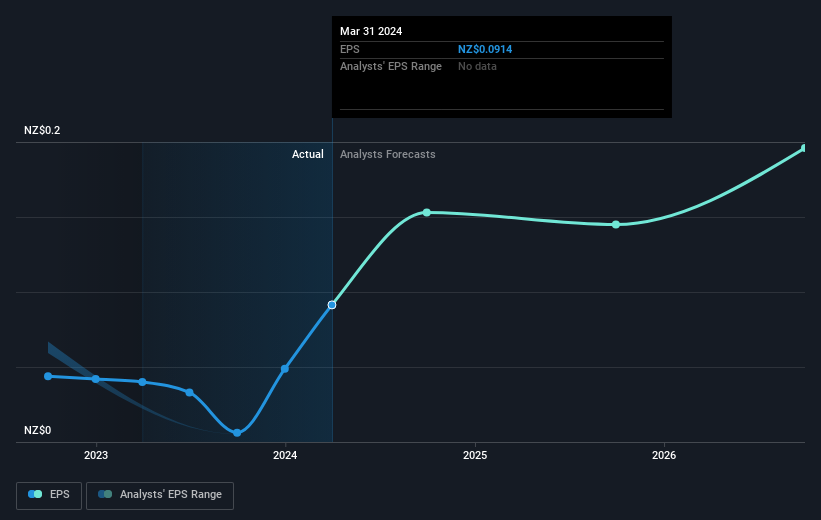- New Zealand
- /
- Insurance
- /
- NZSE:TWR
The 74% return delivered to Tower's (NZSE:TWR) shareholders actually lagged YoY earnings growth

Passive investing in index funds can generate returns that roughly match the overall market. But one can do better than that by picking better than average stocks (as part of a diversified portfolio). For example, the Tower Limited (NZSE:TWR) share price is up 68% in the last 1 year, clearly besting the market decline of around 0.5% (not including dividends). That's a solid performance by our standards! Also impressive, the stock is up 50% over three years, making long term shareholders happy, too.
After a strong gain in the past week, it's worth seeing if longer term returns have been driven by improving fundamentals.
See our latest analysis for Tower
While the efficient markets hypothesis continues to be taught by some, it has been proven that markets are over-reactive dynamic systems, and investors are not always rational. By comparing earnings per share (EPS) and share price changes over time, we can get a feel for how investor attitudes to a company have morphed over time.
Tower was able to grow EPS by 129% in the last twelve months. This EPS growth is significantly higher than the 68% increase in the share price. So it seems like the market has cooled on Tower, despite the growth. Interesting. The caution is also evident in the lowish P/E ratio of 11.49.
The image below shows how EPS has tracked over time (if you click on the image you can see greater detail).

We know that Tower has improved its bottom line over the last three years, but what does the future have in store? Take a more thorough look at Tower's financial health with this free report on its balance sheet.
What About Dividends?
When looking at investment returns, it is important to consider the difference between total shareholder return (TSR) and share price return. Whereas the share price return only reflects the change in the share price, the TSR includes the value of dividends (assuming they were reinvested) and the benefit of any discounted capital raising or spin-off. Arguably, the TSR gives a more comprehensive picture of the return generated by a stock. In the case of Tower, it has a TSR of 74% for the last 1 year. That exceeds its share price return that we previously mentioned. And there's no prize for guessing that the dividend payments largely explain the divergence!
A Different Perspective
It's nice to see that Tower shareholders have received a total shareholder return of 74% over the last year. Of course, that includes the dividend. That gain is better than the annual TSR over five years, which is 12%. Therefore it seems like sentiment around the company has been positive lately. Someone with an optimistic perspective could view the recent improvement in TSR as indicating that the business itself is getting better with time. It's always interesting to track share price performance over the longer term. But to understand Tower better, we need to consider many other factors. For example, we've discovered 1 warning sign for Tower that you should be aware of before investing here.
But note: Tower may not be the best stock to buy. So take a peek at this free list of interesting companies with past earnings growth (and further growth forecast).
Please note, the market returns quoted in this article reflect the market weighted average returns of stocks that currently trade on New Zealander exchanges.
Valuation is complex, but we're here to simplify it.
Discover if Tower might be undervalued or overvalued with our detailed analysis, featuring fair value estimates, potential risks, dividends, insider trades, and its financial condition.
Access Free AnalysisHave feedback on this article? Concerned about the content? Get in touch with us directly. Alternatively, email editorial-team (at) simplywallst.com.
This article by Simply Wall St is general in nature. We provide commentary based on historical data and analyst forecasts only using an unbiased methodology and our articles are not intended to be financial advice. It does not constitute a recommendation to buy or sell any stock, and does not take account of your objectives, or your financial situation. We aim to bring you long-term focused analysis driven by fundamental data. Note that our analysis may not factor in the latest price-sensitive company announcements or qualitative material. Simply Wall St has no position in any stocks mentioned.
Have feedback on this article? Concerned about the content? Get in touch with us directly. Alternatively, email editorial-team@simplywallst.com
About NZSE:TWR
Tower
Provides general insurance products in New Zealand and the Pacific Islands.
Outstanding track record with excellent balance sheet and pays a dividend.
Similar Companies
Market Insights
Community Narratives


